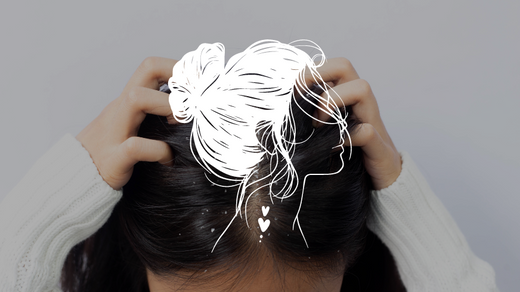Hoofdroos, ook wel bekend als roos, is een veelvoorkomend en vervelend probleem dat de hoofdhuid treft. Het gaat vaak gepaard met witte schilfers die zich op de hoofdhuid én kleding kunnen ophopen. Maar het is niet alleen een cosmetisch ongemak, het kan ook jeuk en irritatie veroorzaken. In deze blog bekijken we wat hoofdroos precies is, wat de mogelijke oorzaken zijn en hoe supplementen kunnen helpen bij het verlichten van dit ongemak.
Wat is hoofdroos?
Hoofdroos is een veel voorkomende aandoening van de hoofdhuid die wordt gekenmerkt door schilfering van de huid. Het ontstaat wanneer de natuurlijke celvernieuwing van de hoofdhuid sneller verloopt dan normaal, waardoor dode huidcellen zich ophopen en zichtbaar worden als witte schilfers.
Het duurt normaliter gemiddeld 3 weken voordat je hoofdhuid zich vervangt. Bij hoofdroos gaat dit proces twee keer zo snel. De huidschilfers kunnen de hoofdhuid niet snel genoeg verlaten waardoor ze samenklonteren en zichtbaar worden. Deze schilfers kunnen overal op de hoofdhuid voorkomen, en in sommige gevallen kunnen ze zelfs op de schouders terechtkomen.
Doordat ook de talgklieren harder gaan werken en meer talg afscheiden, kan er jeuk ontstaan. Roos is een milde vorm van seborrhoïsch eczeem. Hierbij is de samenstelling van vetzuren van de talgklieren uit balans waardoor huid gaat schilferen. Wanneer hier vanuit het lichaam een ontstekingsreactie op komt, kan er een lichte zwelling en roodheid ontstaan.
Oorzaken van hoofdroos
Hoewel de exacte oorzaak van hoofdroos niet volledig begrepen is, zijn er verschillende factoren die kunnen bijdragen aan het ontstaan ervan.
Huidgevoeligheid
Mensen met een gevoelige hoofdhuid kunnen sneller last hebben van hoofdroos. Irritatie door haarproducten, warm water of bepaalde weersomstandigheden kan de symptomen verergeren.
Hormonale veranderingen
Veranderingen in hormonen, zoals die tijdens de puberteit, zwangerschap of bepaalde medische aandoeningen, kunnen de kans op hoofdroos vergroten.
Daarnaast kunnen stress, emotionele spanningen en koude droge lucht de klachten van hoofdroos verergeren.

Tips om hoofdroos te verlichten
We delen graag een aantal tips met je om hoofdroos klachten te verminderen.
Haren wassen
Gebruik natuurlijke shampoo en masseer je hoofdhuid tijdens het wassen. Vermijd shampoos die bedoeld zijn voor vet haar, deze drogen de hoofdhuid uit met overmatige talgproductie als gevolg. Geef je hoofdhuid de kans om te herstellen en was het niet vaker dan 2 keer per week.
Wil je meer lezen over het voeden van je huid van binnenuit? In ons e-book ‘Zin & onzin over beauty en supplementen’ leggen we je uit wat jouw huid allemaal beïnvloedt (vanaf binnen en buiten), hoe jij je huid jong en stralend kunt houden en gaan we verder in op de rol van supplementen voor je uiterlijk, want heeft dat nu eigenlijk zin of niet?








